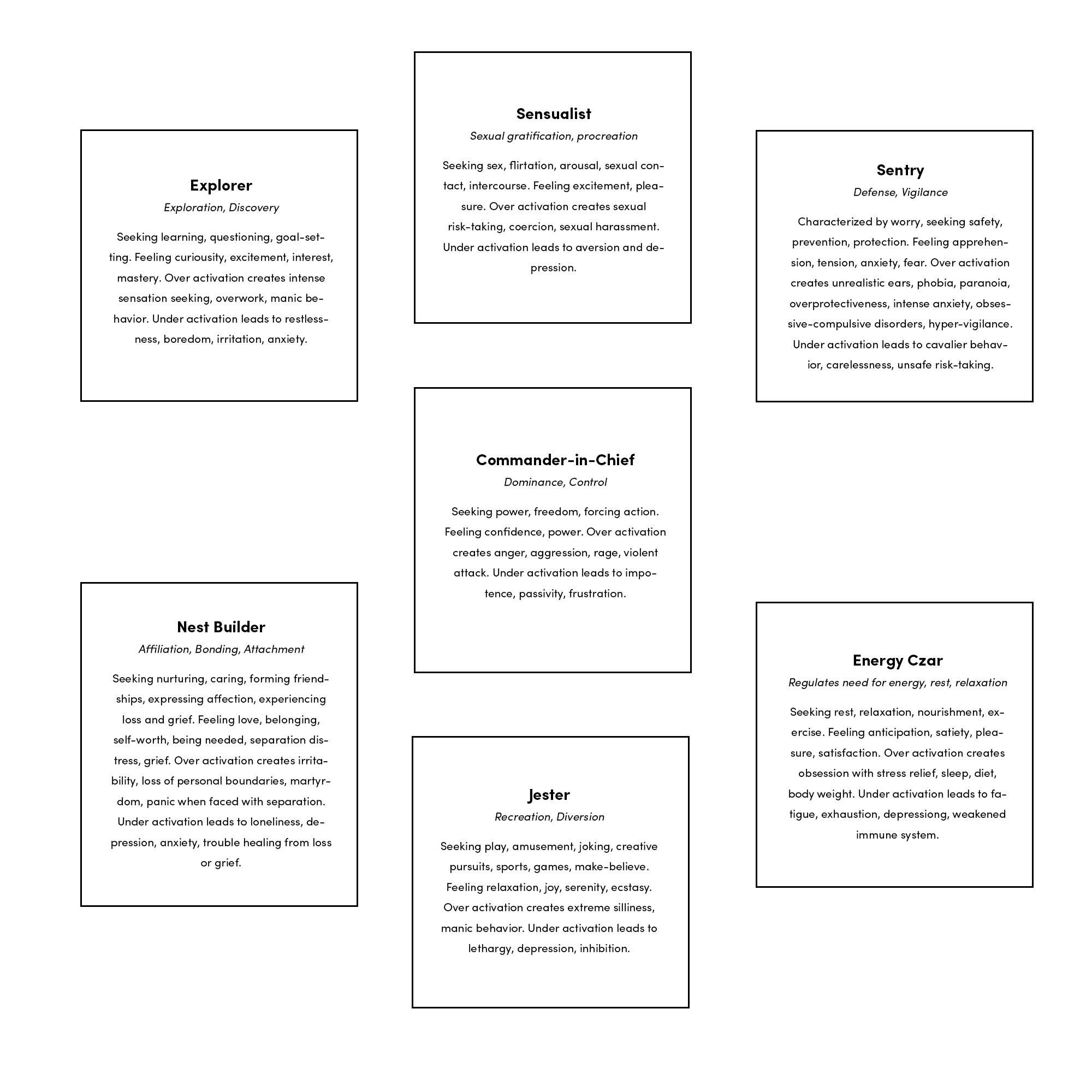According to research conducted by neuroscientist Dr. Jaak Panksepp, there are seven distinct “emotional command systems” believed to be present in each person’s brain. Each command system coordinates the emotional, behavioral, and physical responses needed for certain functions related to survival, including rest, procreation, and self-defense.
Dr. Gottman labeled these systems (e.g., “Jester,” “Sensualist,” etc.) to help people understand how each one functions. As he explains in “The Relationship Cure,” acknowledging emotional similarities and differences in your relationships is an important part of bidding and responding to bids for emotional connection.
The seven emotional command systems
What exactly are these emotional command systems? Imagine your nervous system as a railroad and your emotions as a train. The emotional command systems are the tracks on which your emotions run.
The seven emotional command systems and what they’re responsible for are:
- Jester: play and fun
- Sensualist: attraction and lust
- Nest-Builder: affiliation, friendship, care, and nurturing
- Commander-in-Chief: dominance, control, and power
- Explorer: searching, learning, and goal setting
- Energy Czar: getting rest, finding food, and staying healthy
- Sentry: vigilance, defense, and avoiding danger
Everyone has different levels of comfort within each system. For instance, Susan is not as comfortable with her Jester command system as David. While David enjoys playing with their seven-year-old, Susan is more comfortable with her Sentry command system, which is focused on protecting her son from getting hurt.
Each system is key in your ability to respond to threat, fall in love, or be playful.
These different command systems often work together to achieve a goal. For example, the Energy Czar might call upon the Explorer to search for food or the Nest Builder may utilize the Sentry to protect her child and look out for danger.
How your emotional command systems are formed
Your command systems are shaped by your temperament and family of origin. So, if you were raised in a family where your parents were always on the lookout for danger, you likely have a more highly developed Sentry system than someone who was raised in a home that was focused more on play, joking, and laughing, resulting in a more evolved Jester system for that person.
Your life experiences also influence the development of your emotional command systems. As Dr. Gottman explains, “our environment actually affects the way nervous pathways in the brain get built.” For example, the amount of wrestling and tickling a child gets may affect the formation of the system that coordinates play (the Jester).
When your command systems are neglected
When your preferred level of activation of a certain command system is not being met, you will feel distressed. For example, if you are someone who needs a lot of friendship and connection (Nest Builder) and you are re-located to a new city for a job where you know no one, you will inevitably experience distress because you are not meeting the need for connection and affiliation.
If you are a Commander-in-Chief and you crave power and control, but you are dating someone else who likes to be in charge and call the shots, then conflict for power is bound to happen.
Your command systems influence the emotional connection in your relationship. For example, Kate is more of an Energy Czar and she is married to John who is more of a Jester. Often John wants to go do fun activities while Kate is worried about not getting enough sleep and staying healthy.
By teaching Kate and John about the seven emotional command systems, they were able to talk about their differences to help them understand each other better. By understanding each other better, they stopped feeling hurt when the other partner wanted to express a different command system. When I worked with this couple, I helped them become attuned to each other’s system and helped them find creative ways to build more fun and play and sensuality in their marriage.
This is applicable even in the context of friendships and work relationships. If you are not comfortable with your Commander-in-Chief system, but you get a sudden promotion and are now in charge of a large team of people, this may be very uncomfortable for you. If you are an Explorer at heart but find yourself in a job that doesn’t promote creativity, curiosity, or learning, then you may become bored and lethargic. If you are a Nest Builder and your best friend moves away you may find yourself quite lonely because you’re no longer meeting that need for connection with your best friend.
By understanding your emotional command systems as well as the systems of your romantic partner, you can learn how to navigate the differences in a way that meets both partner’s needs. As a result, you’ll have a deeper intimate connection with each other because both of you feel understood and valued.
Recommended reading
“The Relationship Cure” by Dr. John Gottman
Take the quiz starting on page 101 to learn which command systems you lean on most and read suggestions on how to better meet your needs and your partner’s needs.
“Affective Neuroscience” by Dr. Jaak Panskepp
Provides the most up-to-date information about the brain-operating systems that organize the fundamental emotional tendencies of all mammals.
“The Archeology of Mind” by Dr. Jaak Panskepp
Presents an affective neuroscience approach (which takes into consideration basic mental processes, brain functions, and emotional behaviors that all mammals share) to locate the neural mechanisms of emotional expression.
The Marriage Minute is our email newsletter from The Gottman Institute that will improve your marriage in 60 seconds or less. More than 40 years of research with thousands of couples shows a simple fact: small things often can create big changes over time. Got a minute? Sign up below.











